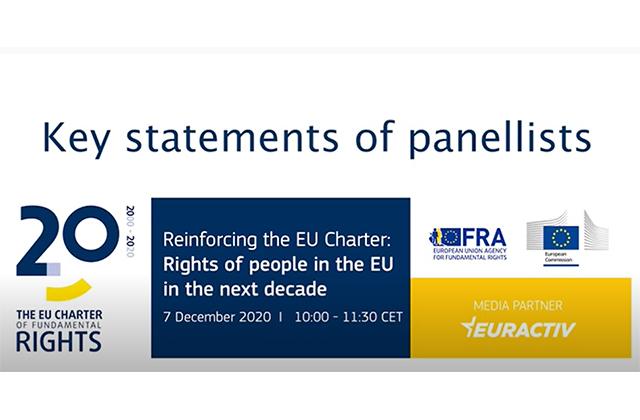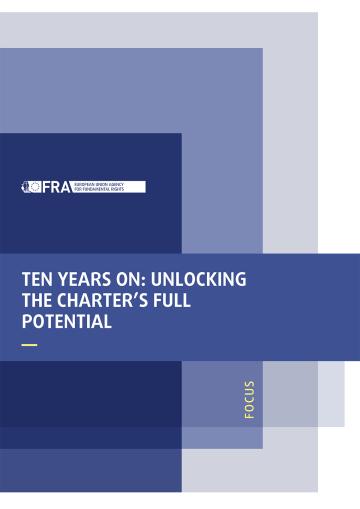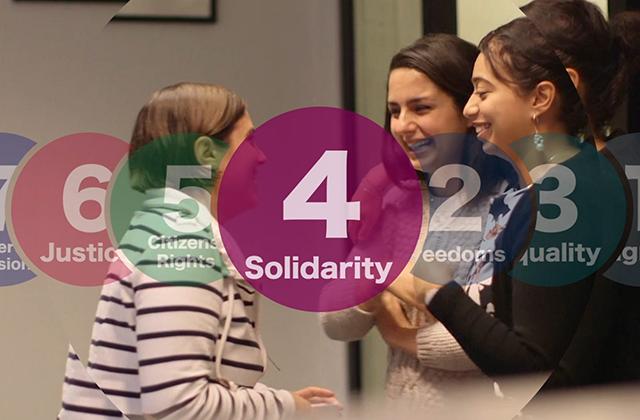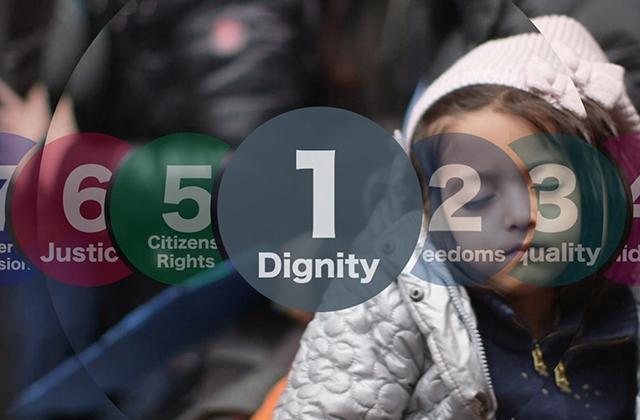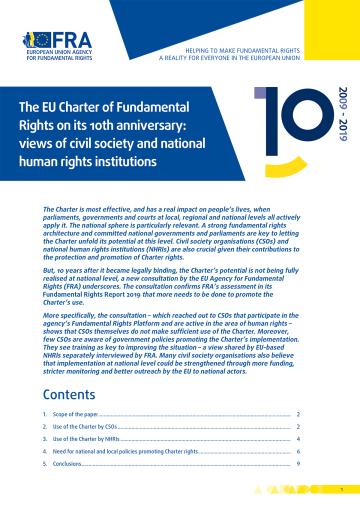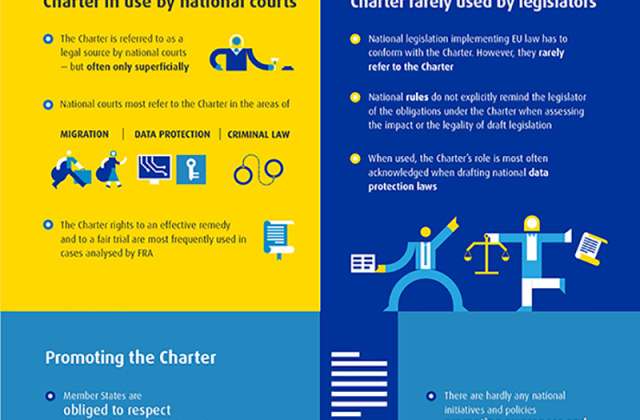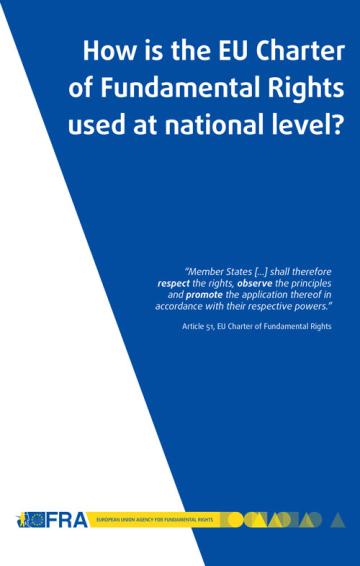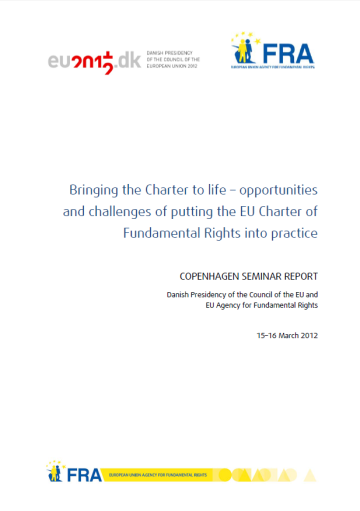
EU Charter of Fundamental Rights
The Charter of Fundamental Rights of the European Union enshrines into primary EU law a wide array of fundamental rights enjoyed by EU citizens and residents. It became legally binding with the coming into force of the Treaty of Lisbon on 1 December 2009.
This section of the website encompasses Charterpedia, an online tool which provides easy-to-access information about the Charter and its provisions. For each Charter Article, it includes the official explanations of the Charter Articles, related European and national case law, and related provisions in national constitutional law as well as in international law. It also contains references to academic analysis and related FRA publications. The information is also available offline in our EU Charter App.
The original compilation was created by the European Parliament’s Civil Liberties, Justice and Home Affairs (LIBE) Committee. Since 2009 it has been maintained and continuously expanded by the FRA.
The European and national case law is also accessible via the Case-Law Database.
Access the Charter in International Sign Language
Our new e-learning tool Charter e-guidance assists judges and other legal practitioners on the field of application of the Charter as laid down in Article 51.
OFFICIAL DOCUMENTS
- Annual report by the European Commission on the application of the EU Charter of Fundamental Rights (2010 onwards)
- Strategy to strengthen the application of the Charter of Fundamental Rights in the EU
- Commission notice - Guidance on ensuring the respect for the Charter of Fundamental Rights of the European Union when implementing the European Structural and Investment Funds (‘ESI Funds’)
- Council Conclusions on the Charter of Fundamental Rights after 10 Years: State of Play and Future Work, 20.9.2019
- European Parliament resolution of 12 February 2019 on the implementation of the Charter of Fundamental Rights of the European Union in the EU institutional framework (2017/2089(INI))
- How to better implement the EU Charter of Fundamental Rights - Selected Quotes from European Parliament and Council Conclusions 2010 - 2020
ARTICLE-BY-ARTICLE COMMENTARIES ON THE CHARTER
- Bifulco, R., Cartabia, M. and Celotto, A. (2001), L’Europa dei diritti: Commento alla Carta dei diritti fondamentali dell’Unione Europea, il Mulino, Bologna.
- Coghian N. Steiert M. (eds.) (2020), The Charter of Fundamental Rights of the European Union: the travaux préparatoires and selected documents
- Holoubek, M. and Lienbacher, G. (eds.) (2019), Commentary on the Charter of Fundamental Rights of the European Union (GRC-Kommentar), 2nd edition, Manz, Vienna;
- Kellerbauer, M., Klamert, M. and Tomkin J. (eds.) (2019), Commentary on the EU Treaties and the Charter of Fundamental Rights, Oxford University Press, Oxford.
- Mangas Martin, A. (2008), Carta de los derechos fundamentales de la Unión Europea: Comentario, artículo por artículo, Fundacion BBVA, Bilbao.
- Mastroianni, R., Allegrezza, S., Razzolini, O., Pollicino, O. and Pappalardo, F. (eds.) (2017), Carta dei diritti fondamentali dell’Unione Europea, Giuffrè, Milano;
- Meyer, J. and Hölscheidt, S. (eds.) (2019), Charta der Grundrechte der Europäischen Union: Kommentar, (Commentary on the Charter of Fundamental Rights of the European Union) 5th edition.
- Peers, S., Hervey, T., Kenner, J. and Ward, A. (scheduled for 2021), The EU Charter of Fundamental Rights: A commentary, 2nd edition, CH Beck Hart Nomos, Oxford;
- Picod, F., Rizcallah, C. and Van Drooghenbroeck, S. (2020), Charte des droits fondamentaux de l’Union européenne: Commentaire article par article (Charter of Fundamental Rights of the European Union: Commentary article-byarticle), Bruylant, Bruxelles.
- Sachpekidou E., Tagaras Ch., Kanellopoulou-Malouchou N., Karagiannis V., Lentzis D., Marouda M.-N., Sarmas D., Takis A., Tsolka O., (2020), Κατ’ άρθρο ερμηνεία του Χάρτη των Θεμελιωδών Δικαιωμάτων της Ευρωπαϊκής Ένωσης (Article-By-Article Commentary Of The Eu Charter Of Fundamental Rights ), Nomiki Bibliothiki, 752 p.
- Toggenburg G. (2019 - 2021), All EU-r rights, Online series published in the EURAC Research in English, Blog (and partly available also in Italian on Lo Spiegone)
OTHER DOCUMENTS, SOURCES AND TOOLS (mostly from projects co-funded by the EU)
- Case-law by the Court of Justice of the European Union on the principle of ne bis in idem in criminal matters. Eurojust February 2024
- European Union Agency for Asylum (EUAA) judicial publications
The European Union Agency for Asylum produces a range of judicial publications specifically tailored to the needs of members of courts and tribunals competent in asylum matters. These publications comprise judicial analyses, judicial trainers’ guidance notes and compilations of jurisprudence. All materials are developed in English and are translated in several languages. - ACTIONES (Active Charter Training through Interaction Of National Experiences) was an EU-funded project focused on the vertical and horizontal interaction between courts. It resulted in four handbooks on techniques of judicial interactions in the application of the Charter.
- The Charter in action: an EU-funded project that resulted in a best practices handbook for Charter trainings and a training manual;
- Charterclick was an EU-funded project that resulted in a Charter tutorial and an interactive checklist both designed to make understand whether the Charter applies to a given case. Both tools are available on the e-justice platform of the European Commission.
- European Judicial Training Network (ETJN) database lists all available face-to-face judicial training opportunities.
- Council of Europe HELP training platform provides a range of resources on the ECHR. These include distance-learning and self-learning resources on the ECHR and European human rights standards, as well as handbooks and other useful resources.
- Council of Europe HELP: Introduction to Human Rights Protection in Europe - Interplay between the ECHR and the EU Charter
- Judging the Charter: an EU-funded project which resulted in a set of training events, a manual on the role of the Charter in asylum cases and a Charter website that brings together a large amount of Charter-related information, including exercises and training materials, case law and a selection of relevant EU legislation;
- Library of Charter-specific training materials put together by the European Law Academy in Trier which offers a wide spectrum of trainings on the Charter
- Making the Charter of Fundamental Rights a living instrument: an EU-funded project that resulted in a user-friendly Manual on the Charter and Guidelines for civil society actors on how to best use the Charter;
- Making the EU Charter of Fundamental Rights a reality for all - 12 November 2019 - Conference material
NB: The above links are provided for information purposes only. The FRA bears no responsibility for the accuracy, legality or content of external websites and links.
260 results found
- Freedom of Expression and the EU’s Ban on Russia Today: A Dangerous Rubicon CrossedPublished in: Communications Law Vol. 27 No. 4Publisher:Bloomsbury ProfessionalYear:2022Page numbers:186-193
- Правото на добра администрация – ефективен път към доброто управлениеTranslated Title:The Right to Good Administration – an Effective Path to Good GovernancePublished in: Journal De Jure Vol. 13 No. 1Publisher:St. Cyril and St. Methodius University of Veliko TarnovoYear:2022Page numbers:135-139
- O clarificare necesară. Dreptul Uniunii Europene nu doar că nu impune, dar nici măcar nu permite înlăturarea de la aplicare a recentelor decizii CCR în materia prescripțieiTranslated Title:A necessary clarification. European Union law not only does not require but does not even allow the removal from application of the recent decisions of the RCC in the matter of statute of limitationsPublisher:Juridice.roYear:2022
- The role of Article 47 of the EU Charter of Fundamental Rights in direct and indirect tax cases: Parallel or divergent ways?Published in: REALaw.blogPublisher:Paris LegalYear:2022
- Ein europäisches Grundrecht auf Kündigungsschutz: Art 30 GRCTranslated Title:A European fundamental right to protection against unjustified dismissal: Art 30, EU Charter of Fundamental RightsPublisher:MANZ Verlag Wien, C. H. BeckYear:2022
- Comment: can the Charter help to protect rights in the Member States?Published in: The Practice of Judicial Interaction in the Field of Fundamental Rights (eds. Casarosa, Federica; Moraru, Madalina)Publisher:Edward Elgar Publishing LimitedYear:2022Page numbers:107-111
- Arbeitszeit zwischen unionsrechtlicher Grundrechtecharta und VertragPublished in: Recht der Arbeit Vol. 23 No. 5Publisher:C. H. BeckYear:2022Page numbers:290-302
- Effective judicial protection in consumer litigation. Article 47 of the EU Charter in PracticePublished in: Effective judicial protection in consumer litigation. Article 47 of the EU Charter in PracticePublisher:Intersentia / Cambridge University PressYear:2022
- The Right to an Effective Remedy under the First Paragraph of Article 47 of the CharterPublished in: The EU Charter of Fundamental Rights - A Commentary (eds. Peers, Steve; Harvey, Tamara; Kenner, Jeff; Ward, Angela)Publisher:Hart BloomsburyYear:2021Page numbers:1261-1307
- The charter of fundamental rights, the aims of EU competition law and data protection: Time to level the playing fieldPublished in: Singapore Journal of Legal StudiesPublisher:National University of SingaporeYear:2021Page numbers:39-55
- The politicization of human rights in the universal pandemic 2020: the relationship between the Charter of Fundamental Rights of the European Union and the international tax lawPublished in: Juridical Tribune Vol. 11 No. 1Publisher:Law Department of The Bucharest Academy of Economic Studies & Society of Juridical and Administrative SciencesYear:2021Page numbers:52-71
- On the (In)Applicability of the EU Charter of Fundamental Rights to National Measures Exceeding the Requirements of Minimum Harmonisation DirectivesPublished in: European Law Review 46 1Publisher:Sweet & MaxwellYear:2021Page numbers:81-91
- The Charter of Fundamental Rights of the European UnionPublisher:Publication OfficeYear:2021
- The EU Charter of Fundamental Rights: in bad need of instructions for use?Published in: National Judges and the Case Law of the Court of Justice of the European UnionPublisher:Romatre-PressYear:2021Page numbers:165-183
- Article 51 of the EU Charter of Fundamental Rights from the Perspective of the National JudgePublished in: Review of European Administrative Law 13 4Publisher:Paris Legal PublishersYear:2021Page numbers:53-85
- European Commission v Hungary (Transparency of associations) (C-78/18): The "NGOs case": on how to use the EU Charter of Fundamental Rights in infringement actionsPublished in: European Law Review 46 2Publisher:Sweet & MaxwellYear:2021Page numbers:258-271
- EU Fundamental Rights Law and Policy in the Shadow of the CharterPublished in: EU law Live, Weekend edition 78Year:2021
- Twenty years later: Application of the Charter of Fundamental Rights of the European Union as an Anthropocentric and Innovative DocumentPublished in: Revista jurídica de Presidência 23 129Publisher:Centro de Estudos Jurídicos da PresidênciaYear:2021Page numbers:23-46
- The impact of the Charter of Fundamental Rights: The case of the Returns DirectivePublished in: Law, Responsibility and Vulnerability: State Accountability and ResponsivenessPublisher:RoutledgeYear:2021
- Integrating Human Rights and Environmental Duties: Prospective Implications of Article 37 of the EU Charter of Fundamental RightsPublished in: Boston University International Law Journal 39 1Year:2021Page numbers:41-78
89 total results found
- Year:2022Summary:This was a parliamentary debate on the need to regulate telework and safeguard the right to disconnect from telework, in preparation for a bill to be presented by the government to address this.
The discussion on the repercussions of telework especially since the outbreak of the pandemic was aimed at informing the compilation of a draft that will be compiled and presented to parliament by the government. Compliance with Charter was amongst the arguments raised in favour of regulating telework and safeguarding workers’ rights. - Published in: Estonia, RiigikoguYear:2019Summary:The Prime Minister mentioned the anniversary of the Charter in his speech to the Parliament regarding Estonia’s EU policies.
Quote: “Kaugelt vaadates paistab Euroopa endiselt kui vabaduste oaas. Äsja sai koos Lissaboni leppega kümneaastaseks maailmas ilmselt kõige nüüdisaegsem inimõigusleping, Euroopa Liidu põhiõiguste harta. Selle esimene lause ütleb: "Euroopa rahvad on üha tihedamat omavahelist liitu luues otsustanud jagada rahulikku, ühistele väärtustele rajatud tulevikku." Põhiõiguste harta esimene artikkel sätestab inimväärikuse puutumatuse, austamise ja kaitse, sest ilma selleta ei ole rahu, ei ole vabadusi, ei ole ka Euroopat, nagu me teda tunneme.”
Translate quote: “Looking from afar, Europe continues to look like an oasis of freedoms. Not long ago, probably the most modern human rights treaty in the world, the European Union Charter of Fundamental Rights, turned 10 years old together with the Lisbon Treaty. Its first sentence states: “The peoples of Europe, in creating an ever closer union among them, are resolved to share a peaceful future based on common values.” The first Article of the Charter of Fundamental Rights legislates the inviolability, respect and protection of human dignity, without which there is no peace, there are no freedoms, and there is no Europe as we know it.” - Published in: Diário da Assembleia da República, I Série, n.º 14, 05/12/2019Page numbers:39-44Year:2019Summary:The Charter is mentioned in a plenary meeting, by Bacelar de Vasconcelos. In a political statement, Bacelar de Vasconcelos referred to the celebration of the 10 years of the entry into force of the Charter of Fundamental Rights of the European Union and critically reflected on the role of this instrument in the last 10 years and its implementation.
Quote: “(…) No domingo passado, 1.º de dezembro, completaram-se 10 anos sobre a entrada em vigor da Carta dos Direitos Fundamentais da União Europeia, parte integrante do Tratado de Lisboa, assinado, nesta cidade, em dezembro de 2007. (...) É hoje decisivo ponderar de forma séria e crítica o que mudou entretanto (...).
O balanço da aplicação da Carta ainda está por fazer, mas temos de admitir que a resposta aos desafios que enfrentámos nos últimos 10 anos é confrangedora.
(...) é fundamental falar da Carta, divulgá-la e avaliar a sua aplicação, para tentar compreender porque é que ela foi ignorada nos primeiros 10 anos da sua entrada em vigor e extrair dela as orientações e os objetivos indispensáveis para garantir um futuro à União Europeia.”
Translated quote: "(…) Last Sunday, 1 December, 10 years passed after the entry into force of the Charter of Fundamental Rights of the European Union, which is an integral part of the Treaty of Lisbon, signed in this city in December 2007. (. ..) Today it is imperative to consider seriously and critically what has changed (...).
The application of the Charter is still being reviewed, but we have to admit the answer to the challenges we have faced in the last 10 years is appalling.
(...) It is essential to talk about the Charter, to disseminate and to evaluate its application, in order to understand why it was ignored in the first 10 years of its entry into force and to draw from it the guidelines and objectives necessary to guarantee a future for the European Union.” - Year:2019Summary:During the debates on the vanishing of the Rule of law in France the Charter was referenced in order to recall that any limitation of freedoms should be necessary, proportionate and placed under the control of a judge.
- Year:2019Summary:MP László Böröc presented Bill no. T/7694 to the plenary of the National Assembly. This bill on the amendment of certain acts related to the regulation of the industry and the market with the aim of harmonisation was introduced by the Government. In order to emphasise the importance of the legislative proposal, MP Böröc mentioned that it is adopted in order to comply with – inter alia – the EU Charter of Fundamental Rights, especially the freedom to choose an occupation and to conduct business. Interestingly, neither the normative part nor the explanatory memorandum of Bill no. T/7694 contains any reference to the Charter.
Quote: „Ahogy az államtitkári expozéban hallhatták, az önök előtt fekvő egyes törvények ipar- és kereskedelemszabályozási szempontból történő, valamint jogharmonizációs célú módosításáról szóló T/7694. számú országgyűlési határozati javaslat több lényeges elemet tartamaz az ipar- és a kereskedelemszabályozás tekintetében, amelyek közül néhányat szeretnék megemlíteni. A határozati javaslat egyik fontos alappillére az uniós jogharmonizációs kötelezettségeink teljesítése. Az EU 2018/958-as irányelve szerint a foglalkozás megválasztásának szabadsága alapvető jog. Az Európai Unió jogi chartája garantálja a foglalkozás megválasztásának szabadságát, valamint a vállalkozás szabadságát. A munkavállalók szabad mozgása, a letelepedés szabadsága, a szolgáltatásnyújtás szabadsága a belső piac alapvető, az Európai Unió működéséről szóló szerződésben rögzített elvei. A szabályozott szakmákhoz való hozzáférést szabályozó nemzeti szabályok ezért nem gördíthetnek indokolatlan vagy aránytalan akadályt ezen alapvető jogok gyakorlása elé.”
Translated quote: “As you could hear from the secretary of State, the proposal for Resolution of the National Assembly no. T/7694 on the amendment of certain acts related to the regulation of the industry and the market with the aim of harmonization contains a lot of important elements, from which I would like to mention a few. One of the important pillars of the proposal is the compliance with the obligation of harmonisation. According to the Directive 2018/958 the freedom to choose an occupation is a fundamental right. The EU Charter of Fundamental Rights guarantees the freedom to choose an occupation and the freedom to conduct business. The free movement of persons, goods and services are the fundamental principles of the internal market as enshrined in the Treaty on the Functioning of the European Union. Consequently, the national legislation regulating the freedom to choose an occupation cannot limit these rights unreasonably or disproportionately.” - Year:2019Summary:During parliamentary question time a Member of the Chamber of Deputies submitted an interpellation to the Minister of Culture. He asked why the Czech Republic did not join Poland which was challenging Article 17 of the Copyright Directive before the CJEU. Minister Zaorálek explained that, according to the legal analysis provided by the General Secretariat of the EU Council, Article 17 of the Copyright Directive is in compliance with the Charter. Therefore, the Czech Republic did not see any reason to challenge it.
- Translated Title:Year:2019Summary:For family members of third-country nationals usually a visa under the "Visa Code" is required. For invitations by Austrian citizens, the procedure called "electronic declaration of commitment" (elektronische Verpflichtungserklärung, EVE) has been established. The authors request information on whether the EVE procedure has ever been subjected to an assessment in the light of Article 8 ECHR and Article 7 EUCFR.
- Translated Title:Year:2019Summary:The EU Charter of Fundamental Rights was mentioned while discussing the conversion into law of Decree Law No. 53 of 14 June 2019, Urgent provisions on public order and security, which – among other relevant aspects concerning public security – introduced harsher rules in relation to maritime border checks with a view to governing save-and-rescue (SAR) operations carried out in the Mediterranean Sea by national and international non-governmental organisations (NGOs). The EU Charter of Fundamental Rights was mentioned to argue that the set of rules affecting NGOs’ operations at sea is in breach of several binding international law provisions, including the EU Charter of Fundamental Rights. Article 50 of the latter was also mentioned to argue that the financial administrative sanctions imposed by Decree Law No. 53/2019 on NGOs’ vessels violate the ne bis in idem principle, since the captains of the vessels are also subject to the national criminal justice system for the same behaviours.
Quote: “Ancora, che nulla muta in ordine al dovere per il nostro Paese di offrire, quando le condizioni lo richiedano, un porto di approdo sicuro alla nave che ne faccia richiesta, essendo da escludere, allo stato, che la Libia possa essere considerata un porto di approdo sicuro. E ancora, che dovremo continuare a rispettare le norme convenzionali previste dalla Convenzione di Ginevra sullo statuto dei rifugiati. E ancora, saremo chiamati a rispettare la Carta dei diritti fondamentali dell’Unione Europea, che protegge il diritto d’asilo; diritto fondamentale, peraltro, tutelato anche dall’articolo 10, comma 3, della nostra Costituzione che vieta le espulsioni collettive e le espulsioni verso Paesi in cui lo straniero sia esposto al rischio di pena di morte, tortura o trattamenti inumani e degradanti. E allora, alla luce di quanto detto fino adesso, il provvedimento in titolo appare evidentemente, allo stato, sostanzialmente disapplicabile in via interpretativa dai giudici […] La sanzione amministrativa, piuttosto onerosa, si aggiunge alle sanzioni penali quando il fatto costituisca reato, verosimilmente quello di favoreggiamento dell’immigrazione irregolare. Peccato che, come hanno rilevato tutti gli auditi, questa duplicazione sanzionatoria si ponga in conflitto con il divieto del ne bis in idem, sancito dall’articolo 649 del codice di procedura penale, dall’articolo 50 della Carta dei diritti fondamentali dell’Unione Europea e dall’articolo 4, protocollo 7, della Convenzione europea dei diritti dell’uomo.”
Translated quote: “Moreover, nothing changes as to the obligation upon our country to offer – whenever needed – a place of safety to the vessel asking for it, considering that Libya cannot be deemed a safe port of call at the moment. And again, we are compelled to respect international legislative provisions enshrined in the Convention Relating to the Status of Refugees (signed in Geneva). And again, we are compelled to respect the EU Charter of Fundamental Rights, which safeguards the right of asylum; this fundamental principle is guaranteed also by Article 10, paragraph 3 of our Constitution, which outlaws collective pushbacks and return operations to those countries where third-country nationals would be exposed to death penalty, torture, or inhuman treatments. Consequently, considering what has been argued so far, the considered decree can undoubtedly be interpreted by Italian judicial authorities as unenforceable […] The rather heavy administrative sanction further exacerbates the criminal penalty when a behaviour constitutes a crime (most probably facilitation of irregular immigration). However, as stressed by many auditioned experts, such duplication of sanctions is in contrast with the ne bis in idem principle, envisaged by Article 649 of the Italian Criminal Procedure Code, by Article 50 of the EU Charter of Fundamental Rights, and by Article 4 of Protocol No. 7 to the ECHR.”
- Published in: Diário da Assembleia da República, II Série-A, n.º 121, 03/07/2019Page numbers:259, 277Year:2019Summary:The Charter is mentioned in a technical note drawn up by the support services of the Committee on the Constitutional Affairs, Rights, Freedoms and Guarantees concerning the approval of the Draft Law no. 205/XIII/4.ª, which approves the legal framework of the access to the law and the courts, and served as a basis for parliamentary discussions.
Quote: “Ao mesmo tempo, o Acórdão do Tribunal de Justiça das Comunidades Europeias (Segunda Secção), proferido no Processo C-279/09, em 22/12/2010, vem defender que «O princípio da proteção jurisdicional efetiva, como consagrado no artigo 47.º da Carta dos Direitos Fundamentais da União Europeia, deve ser interpretado no sentido de que não está excluído que possa ser invocado por pessoas coletivas e que o apoio concedido em aplicação deste princípio pode abranger, designadamente, a dispensa de pagamento antecipado dos encargos judiciais e/ou a assistência de um advogado.»”
(...) “O direito ao apoio judiciário está previsto: (...) Na Carta dos Direitos Fundamentais da União Europeia – o artigo 47.º da Carta estabelece que deve ser concedida assistência judiciária a quem não disponha de recursos suficientes, na medida em que essa assistência seja necessária para garantir a efetividade do acesso à justiça.”
Translated quote: (…) “At the same time, the Judgment of the Court of Justice of the European Communities (Second Chamber) of Case C-279/09 of 22/12/2010 states that « The principle of effective judicial protection, as enshrined in Article 47 of the Charter of Fundamental Rights of the European Union, must be interpreted as meaning that it is not impossible for legal persons to rely on that principle and that aid granted pursuant to that principle may cover, inter alia, exemption from advance payment of the costs of proceedings and/or the assistance of a lawyer.»” - Published in: Народно събрание на Република България, двеста седемдесет и девето заседание, София, петък, 28 юни 2019 (National Assembly of the Republic of Bulgaria, 279th session, Sofia, Friday, 28 June 2019)Year:2019Summary:During parliamentary ovesight, a Member of the Parliament asked the Minister of Justice (министър на правосъдието) about the positions Bulgaria expressed during a meeting in the Council of the European Union during the Romanian presidency of the Council. The Minister responded that, among others, Bulgaria supported the reference to the EU Charter of Fundamental Rights within the proposed mandate in relation to the negotiations with the USA on transborder access to electronic evidence and the related protection of data.
- Published in: Diário da Assembleia da República, II Série-A, n.º 117, 26/06/2019Page numbers:1, 9, 15Year:2019Summary:The Charter is mentioned in the explanatory memorandum of the Draft Law and in the technical note drawn up by the support services of the Committee on the Constitutional Affairs, Rights, Freedoms and Guarantees concerning the approval of the “Charter of Fundamental Rights in the digital age” (Draft law no. 1217/XIII/4.ª), which lists a series of principles related to the right of access and to individual protection in the use of digital mechanisms and also defines the State’s obligations in this field.
Quote: “Proliferaram, entretanto, os instrumentos jurídicos vinculativos que à escala de toda a UE definiram políticas e direitos, com destaque para a Carta Europeia dos Direitos Fundamentais, o Regulamento Geral de Proteção de Dados e o Código das Comunicações Eletrónicas.”
“Em termos de enquadramento jurídico a nível internacional, tal como é mencionado na exposição de motivos, apesar de diversos esforços, não existe ainda uma Carta Internacional dos Direitos Digitais, aprovada no âmbito da ONU, mas proliferaram, entretanto, à escala da União Europeia, instrumentos jurídicos vinculativos que definiram políticas e direitos, com destaque para a Carta Europeia dos Direitos Fundamentais, o Regulamento Geral de Proteção de Dados e o Código das Comunicações Eletrónicas.”
(...) “Contudo, a UE tem envidado esforços na modernização das regras atuais, pois estas foram introduzidas num momento em que muitos dos serviços online atuais e os desafios daí decorrentes para a proteção de dados ainda não existiam. Com sítios de redes sociais, computação em nuvem, serviços baseados em localização e cartões inteligentes, o processamento de dados pessoais cresceu exponencialmente, deixando premente a necessidade de um conjunto robusto de regras a fim de garantir que o direito das pessoas à proteção de dados pessoais – reconhecido pelo Artigo 8 da Carta dos Direitos Fundamentais da UE – permaneça eficaz na era digital.”
Translated quote: “In the meantime, the binding legal instruments that have defined EU-wide policies and rights have proliferated, notably the European Charter of Fundamental Rights, the General Data Protection Regulation and the Electronic Communications Code.”
“In terms of the international legal framework, as mentioned in the explanatory memorandum, despite many efforts, there is not yet an International Charter on Digital Rights, approved within the UN framework. However, in the meantime, at EU level, binding legal instruments defining policies and rights have been flourishing, with emphasis on the European Charter of Fundamental Rights, the General Data Protection Regulation and the Electronic Communications Code.”
(…) “However, the EU has been making efforts to modernise the current rules as they were introduced at a time when many of today's online services and the associated challenges to data protection did not yet exist. With social networking sites, cloud computing, location-based services and smart cards, personal data processing has grown exponentially, creating the need for a robust set of rules to ensure that people's right to personal data protection – recognised by Article 8 of the EU Charter of Fundamental Rights – remains effective in the digital age.” - Year:2019Summary:The speech was delivered in the general legislative debate on Bill no. T/6359 introduced by the Government on the amendment of certain acts to transform the structure and financing of the research, development and innovation system. According to the official explanatory memorandum, the legislator’s aim was to enhance the country’s scientific and technological competitiveness. However, the bill was severely criticised by the scientific community and the political opposition. In this debate, MP Gergely Arató criticised the bill and the Government for trying to undermine the independence of the Hungarian Academy of Sciences. Gergely Arató made a brief reference to the EU Charter of Fundamental Rights and the opinion of the European Commission to substantiate his criticism.
Quote: “ […] az Európai Bizottság ma volt olyan kedves, és direktben megüzente: az Európai Bizottság hangsúlyozza a nyílt, versengő finanszírozási rendszerek fontosságát, hiszen ezzel érhető el a minőségi kutatás, ezáltal nőhet a finanszírozás tényleges hatása, illetve erősödhet a nemzeti kutatási rendszer, és így tovább, és így tovább. Az Alapvető Jogok Chartája elismeri az oktatás, kutatás szabadságát és a művészetek, a tudomány szabadságát. Az Európai Bizottság így kiáll a kutatási és tudományos szabadságért és az akadémiai intézmények függetlenségéért.”
Translated quote: “The European Commission was kind enough today to send a clear message : the European Commission emphasises the importance of an open and competitive system of funding because this is the only way to ensure the high quality of research, to increase the efficiency of funding and to strengthen the research network and so on and so forth. The Charter of Fundamental Rights also protects the freedom of arts and sciences. Therefore, the European Commission stands up for the protection of the freedom of scientific research and the independence of the research institutions.” - Translated Title:Year:2019Summary:The Federal Minister of Constitutional Affairs, Reforms, Deregulation and Justice explained in a response to a parliamentary inquiry that the detention conditions in many countries, including EU Member States, are one of the main obstacles to the transfer of prisoners to their home countries. In this context, he refers to the standards of the European Convention on Human Rights and the EUCFR (Art. 4).
- Year:2019Summary:The Parliamentary debate concerned the legislative proposal to extend statutory holidays for all employees from 4 to 5 weeks. Petr Bietl conveyed the negative opinion of the Chamber of Deputies’ Committee on Social Policy, which contained a summary of relevant EU and Czech legislation on this topic. Among other sources, he provided a direct quote from Article 31 of the Charter to prove that, while an employee is entitled to a statutory holiday in accordance with EU law, the length of the holiday is not determined. The Committee stated that the extra week of statutory holiday should remain a voluntary benefit. The reading of the legislative proposal has not yet been completed.
- Published in: Germany, German Bundestag (Deutscher Bundestag) (2019), Plenarprotokoll 19/101, 16 May 2019Page numbers:12149Year:2019Summary:During the debate on the occasion of 70th anniversary of the German Basic Law Andrea Nahles, then leader of the Social Democratic Party, noted that the constitutional mission to realise a united Europe was partly accomplished by the Lisbon Treaty. She claimed that the Fundamental Rights Charter as European constitution is a major step towards a social Europe which has now to be filled with life, among others by introducing a European minimum wage to implement Art. 31 (1) of the Charter.
Quote: “Mit dem EU-Vertrag von Lissabon im Jahr 2009 sind wir auf diesem Weg ein gutes Stück vorangekommen [bei der Verwirklichung eines vereinten Europa]. Vor allem haben wir mit der EU-Grundrechtecharta einen großen und auch rechtsverbindlichen Schritt hin zu einem sozialen Europa getan. Seitdem haben wir beides: eine deutsche Verfassung und ein europäisches Grundgesetz. Es ist jetzt an der Zeit, die Bestimmungen der EU-Grundrechtecharta auch mit Leben zu füllen.”
Translated quote: “With the EU Treaty of Lisbon in 2009, we have made good progress along this path [to realise a united Europe]. Above all, we have taken a major and legally binding step towards a social Europe with the EU Charter of Fundamental Rights. Since then, we have both a German constitution and a European basic law. It is now time to breathe life into the provisions of the EU Charter of Fundamental Rights.” - Year:2019Summary:The Charter was mentioned by the political party CD&V in a discussion in a plenary meeting of the Belgian Senate on 26 April 2019 concerning the bringing up-to-date of Title II of the Belgian Constitution on Belgians and their rights during the next legislature. The party explains that certain fundamental rights that are included in the European Convention on Human Rights and the Charter of Fundamental Rights of the European Union, are not or not entirely protected by the Belgian Constitution because most articles of Title II have remained unchanged since the adoption of the Belgian Constitution in 1831.
Quote: “(…) de visie van CD&V. Een groot deel van onze voorstellen hebben betrekking op de actualisering van titel II van de Grondwet over de Belgen en hun rechten. (…) Deze bepalingen van titel II dateren uit 1831 en geven blijk van een 19e eeuwse visie over grondrechten. Hoewel de grondwetgever vanaf 1970 door toevoeging van enkele nieuwe bepalingen een aantal nieuwe rechten heeft erkend, zijn de meeste artikelen van titel II ongewijzigd gebleven sinds de aanneming en bekrachtiging ervan door het Nationaal Congres in 1831. Daardoor zijn bepaalde grondrechten, gewaarborgd door het EVRM en het Handvest van de grondrechten van de Europese Unie, daarin niet geïntegreerd. Ik denk bijvoorbeeld aan het verbod op foltering en onmenselijke en vernederende behandeling en bestraffing, het recht op een eerlijk proces, de waarborgen bij vrijheidsberoving, het recht op eigendom, de vrijheid van geweten en levensbeschouwing. Die rechten zijn niet of onvolledig gewaarborgd in de Belgische Grondwet. Dat geldt ook voor het meest fundamentele recht dat er bestaat: het recht op leven.”
Translation of quote: “(…) The vision of the CD&V. A large part of our proposals relate to the updating of Title II of the Constitution on Belgians and their rights. (…) These provisions of Title II date from 1831 and reflect a 19th-Century vision on fundamental rights. Although the Constitution has recognised a number of new rights from the addition of some new provisions since 1970, most of the Articles of Title II have remained unchanged since their adoption and ratification by the National Congress in 1831. As a result, certain fundamental rights guaranteed by the ECHR and the Charter of Fundamental Rights of the European Union, are not integrated therein. I am thinking, for example, of the prohibition of torture and inhuman and degrading treatment and punishment, the right to a fair trial, the guarantees of deprivation of liberty, the right to property, freedom of conscience and philosophy of life. These rights are not or not fully guaranteed in the Belgian Constitution. That also applies to the most fundamental right that exists: the right to life.” - Translated Title:Published in: Slovenia, National Assembly of the Republic of Slovenia (Državni zbor Republike Slovenije)Year:2019Summary:The parliament debated at the 21st extraordinary session, held on 25 April 2019, draft amendments to the Social Assistance Act (Zakon o socialnem varstvu), transposing provisions of the Victims’ Rights Directive related to access to victim support services. The MP made reference to the EU Charter when pledging support by his parliamentary group for passing the relevant amendments.
Quote: “Direktiva v našo zakonodajo prenaša pomembne spremembe. Poleg uveljavljanja novih pravic žrtvam kaznivih dejanj, kot je dostop do brezplačnih splošnih in specialističnih storitev za pomoč in podporo, zagotavlja tudi podporo družinskim članom žrtve. Sprejetje ali nesprejetje takšnega zakona sploh ne bi smelo biti vprašanje. Da je človekovo dostojanstvo nedotakljivo in da ga je treba spoštovati ter varovati, mora biti temeljno načelo vseh nas. Zaradi zavedanja, da temu žal ni tako in da nenasilje nad sočlovekom ni splošna vrednota vseh ljudi, je bila na ravni Evropske unije pripravljena listina o temeljnih pravicah, katere glavni namen je državljanom zagotavljati državljanske, politične, ekonomske in socialne pravice.”
Translated quote: “The directive introduces significant changes to our legislation. In addition to implementing new rights for victims of crime, such as access to free general and specialist assistance and support services, it also provides for support to the victim's family members. The adoption or non-adoption of such a law should not be a question at all. The fact that human dignity is inviolable and must be respected and protected should be a fundamental principle for all of us. Recognizing that unfortunately this is not the case, and that non-violence against fellow human beings is not a value shared by all persons , the Charter of Fundamental Rights was drafted at the European Union level, the main purpose of which is to ensure civil, political, economic and social rights for citizens.” - Published in: National Assembly of the Republic of Slovenia (Državni zbor Republike Slovenije)Year:2019Summary:Slovenian weekly Youth (Mladina) published on its front page, in March 2019, a cartoon which depicted the Hungarian Prime Minister, Viktor Orbán, giving the Nazi salute. The Hungarian Embassy to Slovenia immediately issued a protest note to the Slovenian Ministry of Foreign Affairs (Ministrstvo za zunanje zadeve). The Embassy claimed that the cover page violated the principle of freedom of the press and freedom of expression, and protested against its political irresponsibility. It also asked the ministry to prevent any similar incident in the future. Upon receipt of the note, the ministry issued a response to the embassy. On 24 April 2019, the Committee on Foreign Policy and the Committee on Culture gathered on a joint session to debate these developments. When explaining actions by the ministry, the Minister of Foreign Affairs made a reference to the EU Charter.
Quote: “Tako smo v odgovoru že naslednji dan, 26. marca 2019 jasno opozorili na dosledno spoštovanje načela svobode medijev in svobode izražanja, poudarili smo, da Ministrstvo za zunanje zadeve ne posega v uredniško politiko medijev, niti je ne ocenjuje in ta odgovor je jasno povedal, da je bila pravzaprav ta protestna nota neprimerna in nedopustna. Naj ob tem povem, da sta svoboda izražanja in svoboda medijev ne le naši ustavni kategoriji, torej zavarovani ustavni kategoriji, pač pa tudi temeljni vrednoti Evropske unije. 11. člen Listine o temeljnih pravicah izrecno določa pravico do svobode mnenja ter sprejemanja in širjena vesti ali idej, brez vmešavanja javnih organov in ne glede na državne meje.”
Translated quote: “Thus, in our reply, the very next day, on 26 March 2019, we clearly pointed to the strict observance of the principle of freedom of the media and freedom of expression; we stressed that the Ministry of Foreign Affairs neither interfered with editorial policy of the media nor assessed it, and our response clearly stated that, in fact, this protest note was inappropriate and inadmissible. Let me also say that freedom of expression and freedom of the media are not only our constitutional categories, that is - protected constitutional categories, but also the fundamental values of the European Union. Article 11 of the Charter of Fundamental Rights explicitly establishes the right to freedom of opinion and to receive and impart information or ideas, without interference by public bodies and regardless of national borders.” - Year:2019Summary:Senator Alice-Mary Higgins proposed an amendment to the Electoral Act 1992, to extend the right to vote in European elections beyond Irish citizens and European member state citizens to ‘such other persons in the State as may be determined by law’. This attempt to facilitate British citizens voting in European elections post-Brexit was not supported by the government, citing the Lisbon treaty, the Charter of Fundamental Rights and the legal advice which was been received (see quote below). The amendment was put and declared lost.
Quote: "I regret to say I will not be able to support the amendment. The amendment is superfluous in its wording, providing for "such other persons in the State as may be determined by law". Perhaps the Senator wishes to specifically identify British citizens. In regard to voting rights, the Houses are not restricted in prescribing categories of people by law and neither is the Minister. In that sense the amendment is not necessarily required. Extensive legal advice was sought on the voting rights of British citizens resident in Ireland in a post-Brexit scenario. The initial opinion advised that European case law prior to the coming into force of the Lisbon treaty in 2009, which we discussed already, suggested that member states had a degree of discretion in extending voting rights to third country citizens resident in their territories, subject to compliance with certain limits. We spoke about close links. The Senator and I referred to the Spain v. the UK case, which concerned Gibraltar. Several other judgments have taken a similar line.
The position changed utterly with the coming into effect of the Lisbon treaty. Article 14.2 of the Treaty on European Union states, "The European Parliament shall be composed of representatives of the Union's citizens", and "Representation of citizens shall be degressively proportional". The corresponding article in the preceding treaty, the treaty establishing the European Economic Community, provided that the European Parliament, "shall consist of representatives of the peoples of the States brought together in the Community". There has been a change. Off the top of my head I do not know of judgments of the European Court of Justice on that particular aspect of the treaty since the coming into effect of the Lisbon treaty.
Moreover, Article 9 of the Treaty on European Union provides:
Every national of a Member State shall be a citizen of the Union. Citizenship of the Union shall be additional to and not replace national citizenship.
Article 10 states, "Citizens are directly represented at Union level in the European Parliament". Article 39.1 of the Charter of Fundamental Rights of the European Union provides, "Every citizen of the Union has the right to vote and to stand as a candidate at elections to the European Parliament in the Member State in which he or she resides, under the same conditions as nationals of that State."
In the absence of post-2009 case law which directly addresses this issue, the initial legal advice concluded that it may be possible for member states to allow citizens of third countries resident in their territories to vote in EU elections.
A more prudent view is that the 2009 amendment to Article 14.2 of the Treaty on European Union and the prospective 2018 amendments to Article 1.1 of the Act of 1976 separately and together create a minimum requirement of Union citizenship to vote and stand in elections to the European Parliament. Further legal advice was sought, which concluded definitively that any proposal to enfranchise British citizens resident in Ireland after the withdrawal of the UK from the Union for the purposes of the European elections would be inconsistent with the law of the European Union." - Published in: Народно събрание на Република България, двеста и тридесето заседание, София, сряда, 20 февруари 2019г (National Assembly of the Republic of Bulgaria, 230th session, Sofia, Wednesday, 20 February 2019)Year:2019Summary:The Charter was mentioned in the context of a report by MP Tsvetan Tsvetanov concerning a presidential veto on amendments of the Personal Data Protection Act (Закон за защита на личните данни). More specifically the amendments were designed to reach a balance between two non-absolute fundamental rights, namely data protection rights and freedom of expression. In case of a conflict between these two rights, according to the MP, the extreme prioritising of any of these rights to the detriment of the other risks going against the spirit of the Charter . The MP further noted that the freedom of speech and the protection of personal data are not absolute rights and balance should be sought between the two in democratic societies to limit the harm from possible unlawful behavior and not create problematic precedents. According to him, the disputed provisions offer criteria to maintain such balance in accordance with ECHR, ECJ and the national Constitutional Court case law. After the MP’s and other interventions, the parliamentary Internal Security and Public Order Committee (Комисия по вътрешна сигурност и обществен ред) proposed rejecting the presidential veto and confirming the impugned provisions.


